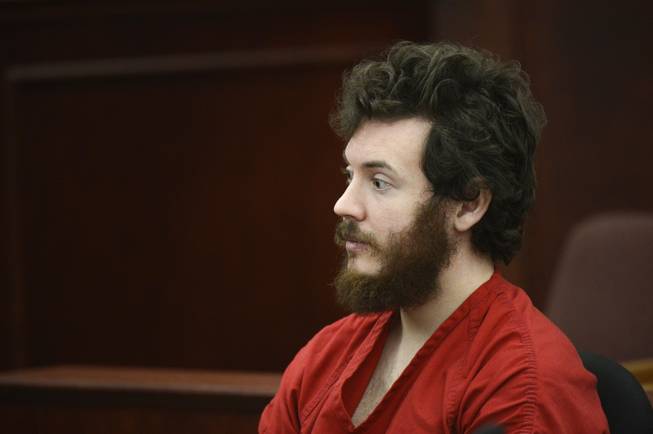
RJ Sangosti / AP
James Holmes, Aurora theater shooting suspect, sits in the courtroom during his arraignment in Centennial, Colo., on Tuesday, March 12, 2013.
Tuesday, April 14, 2015 | 5:47 p.m.
CENTENNIAL, Colo. — A jury was seated Tuesday in the death penalty trial of Colorado theater shooter James Holmes after a selection process that experts say was among the largest and most complicated in U.S. history.
James Holmes is charged with killing 12 people and wounding 70 others in the July 2012 attack in suburban Denver. His attorneys don't dispute that he pulled the trigger but say he was in the grips of a psychotic episode when he slipped into the packed movie theater and opened fire.
Jurors will decide whether he was legally insane at the time. If they find him guilty, they must also decide whether he should be put to death or sentenced to life in prison without parole.
THE BREAKDOWN
The 12 jurors and 12 alternates were chosen after a selection process that began Jan. 20.
There are 19 women and five men, all of whom will sit through the entire trial. Neither the group of 24 nor the public will know who is a primary juror and who is an alternate until the end of the trial.
THE ALTERNATES
Judge Carlos A. Samour Jr. seated a dozen alternates because of the greater likelihood that jurors could have hardships during the lengthy trial.
On Tuesday, the judge excused a potential juror after questions were raised about her impartiality. Another woman was dismissed because her husband also was in the pool, and she said it would be hard on her family if they had to serve.
LINE OF QUESTIONING
Attorneys on Tuesday questioned the 93 remaining jurors about their interpretations of the law, how they would gauge witnesses and experts' credibility, and whether they could handle serving on such a high-profile trial.
District Attorney George Brauchler characterized it as a "four- to five-month roller coaster through the worst haunted house you can imagine."
He asked prospective jurors if they could serve even if they hear no evidence of a motive, since prosecutors are required to prove only the 165 charges against Holmes — not why they believe he committed the crimes.
Holmes' attorney, Tamara Brady, focused on perceptions of Holmes and whether the jury candidates could be objective given the litany of charges against him and the public scrutiny they will face.
"I want to start off by telling you how nervous I am about whether Mr. Holmes can get a fair trial in this case or whether it's just too big," she said.
JURORS' CONCERNS
Potential jurors told attorneys they worry about what their neighbors might think if they reach an unpopular verdict and whether reporters would harass their families.
One man said he was reassured when the judge told him steps were taken to shield his identity. And many pledged they would not let their decision-making be influenced by concern about what others think.
Samour repeatedly has told potential jurors not to listen to, watch or read news of the case, or even be in a position to overhear others discuss it. One potential juror said Tuesday she cancelled her newspaper subscription and was planning to delete the news apps from her smartphone.
Other candidates expressed trepidation about hearing graphic testimony and perhaps being overwhelmed by emotion.
WHAT'S TAKEN SO LONG?
Some prospective jurors have asked the judge why it has taken nearly three years for the case to come to trial.
Samour has said it's not an unusual amount of time for a trial this complex. The death penalty and insanity plea introduced complicated and time-consuming legal requirements.
Experts say the process has been among the nation's largest and most complex. Court officials initially summoned 9,000 prospective jurors, who started filling out questionnaires in January.
Hundreds were then asked to return for one-on-one sessions, where defense attorneys, prosecutors and the judge asked them about their views on the death penalty and mental illness.
WHAT ABOUT OTHER LARGE TRIALS?
In the amount of time it has taken so far in Denver, federal jurors in Boston convicted marathon bomber Dzhokhar Tsarnaev.
That case was accelerated by Tsarnaev's admission that he participated in the April 2013 bombings and that his brother, Tamarlan, was the mastermind.
The Texas trial for the killer of a former Navy SEAL depicted in the movie "American Sniper" was complicated by publicity about the film. But jury selection moved quickly because it didn't involve concerns about the large number of people affected by the crime.
WHAT'S NEXT?
The chosen jurors will report to court the afternoon of April 27 for opening statements.

Join the Discussion:
Check this out for a full explanation of our conversion to the LiveFyre commenting system and instructions on how to sign up for an account.
Full comments policy